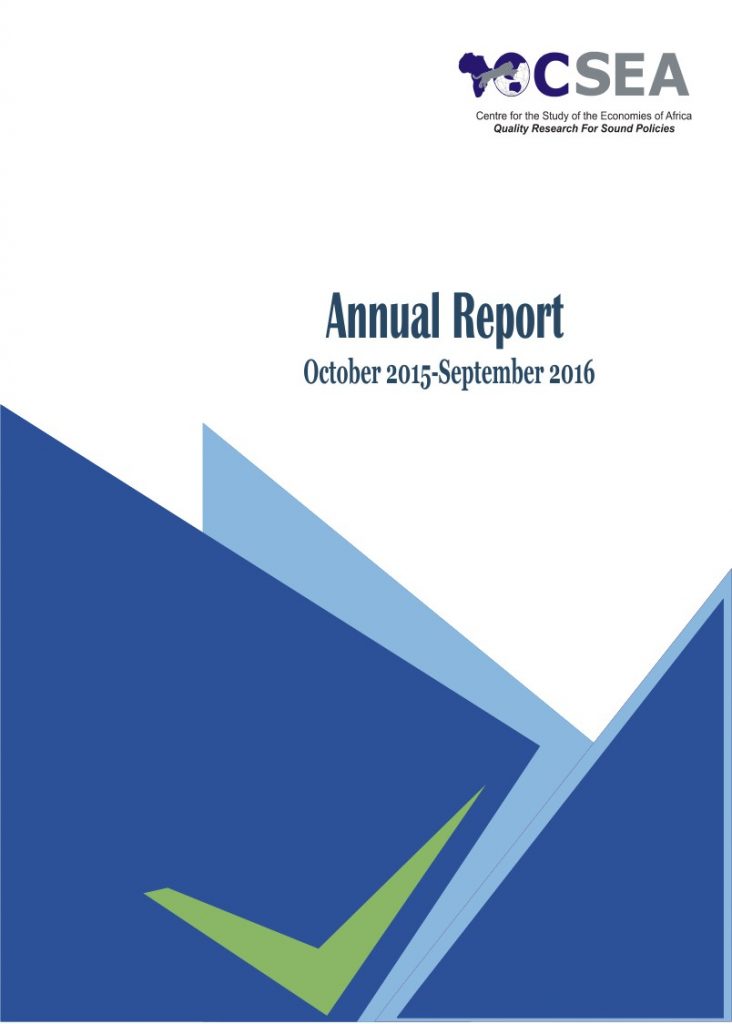CSEA has continued in its tradition of providing rigorous and relevant evidence-based research that is used to inform policies in Nigeria. To provide timely and relevant evidence-based research on Nigeria‟s economy, the Centre established the Information and Data Management Unit (IDM). The main objective of this Unit is to collate qualitative and quantitative data and provide periodic analysis on Nigeria‟s economy. The unit consists of a Research Associate, Research Assistants and Communications officer. The team produces a weekly update of recent happenings in the economy under CSEA‟s thematic research areas.
Annual Report

August 31, 2017
CSEA ANNUAL REPORT
CSEA has continued in its tradition of providing rigorous and relevant evidence-based research that is used to inform policies in Nigeria. To provide timely and relevant evidence-based research on Nigeria‟s economy, the Centre established the Information and Data Management Unit (IDM). The main objective of this Unit is to collate qualitative and quantitative data and […]
Read →
Related
Analysis Of Bilateral Trade In UEMOA The Implications Of Trade Effects
The paper examines the
implications of trade effects in bilateral trade drawing evidence from West
African Monetary and Economic Union (UEMOA). It also discusses the importance
of political stability to trade in ECOWAS countries.
Nigeria Economic Update (Issue 37)
OPEC Monthly oil report reveals that Nigeria
recorded the highest month-on-month increase in crude oil production among the
OPEC member countries in August 2017. Specifically, at an increasing rate of 8
percent, domestic oil production rose to pre-2016 level of 1.86 million barrels
per day in August 2017. With ongoing repairs in the sector, oil
production could get to 2.2 million barrels per day in the near term, albeit
the prior voluntary agreement to cap production at 1.8 million barrels per day.
Going forward, there is need to address poor planning and policy
inconsistencies in the sector, in order to ensure the influx of investors who
have channeled their investments to other African countries due to laxity in
policies in the sector.
Nigeria Economic Update (Issue 18)
Inflation
rate continued its upward trajectory in the week under review. Specifically,
the Consumer Price Index (CPI) increased by 1.39 per cent, from 11.38 per cent
in February to 12.77 per cent in March, 20161. Remarkably, this is the
highest rate since July 2012, representing a 4-year high. While both components
of the CPI rose in the period, the food sub-index was largely the main driver
of the increase in the CPI, with a growth rate of 1.39 per cent between
February and March. The persistent scarcity in petroleum products, especially
Premium Motor Spirit (PMS), has increased transportation costs and the price of
food items.
All-Share Index And Market Capitalization
All-Share Index: In 2016Q1, the decline in ASI was driven by declines in Banking, Insurance, Consumer goods, Oil/Gas, Lotus Islamic, Industrial, AseM, Pension and Premium NSE indices. However, the ASI
